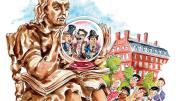Economics professor Melissa Dell has studied everything from colonialism’s impact on development in Indonesia to global trade and worker displacement in Mexico. A development economist, she studies countries her discipline once ignored: “In the 1960s, 1970s, 1980s, people in academic institutions like Harvard predominantly studied the U.S. and Europe,” she explains. “Economics was a very mathematical field” that assumed “markets function perfectly and information is perfect, and you just can’t really think about development if you make those assumptions.” On a College internship in Peru, Dell worked on microfinance, making small loans to women selling snacks on the street—and realized its limits as a poverty alleviation strategy. “If you give another woman a loan to set up a stand,” she says, “it may be good for her, but essentially it’s kind of stealing business from other places.” Growing up in Enid, Oklahoma, where her parents were contractors on an Air Force base, she researched how to apply to schools like Harvard on her own: “At first my parents were kind of annoyed, like, ‘Oh, that’s not a place that’s for people like us.’ ” Financial aid allowed her to attend; she graduated as a top student in 2005. After a Ph.D. from MIT, Dell joined Harvard’s Society of Fellows and then its faculty in 2014. She recently won the Clark Medal, the top prize for economists under 40, and has been diving into machine learning in order to digitize vast troves of data—critical, she says, to unlocking previously unanswerable questions about countries’ economic histories. Meanwhile, the former ultramarathoner’s priorities have been changed by two young children: beyond family and economics, “there’s really not time for anything else.”
Melissa Dell

Melissa Dell
Photograph by Wess Gray/Courtesy of Melissa Dell
You might also like
The 2025 Pulitzer Prizes Announced
Winners across five categories, from commentary on Gaza to criticism on public architecture
Taking the Fight for Equality into the AI Era
Radcliffe Institute conference tackles bias, fairness, inclusivity in AI development.
Ben Franklin’s Project
Historian Joyce E. Chaplin reinterprets an early era of invention, industrialization, and climate challenge
Most popular
Explore More From Current Issue
Short Headlines from Harvard's History
Seniors’ uncertain future c. 1940, Harvard Law Review news, and more
A Harvard Love Story in Poetry
Young love: the poem, plus enduring lessons from a public-health pioneer








